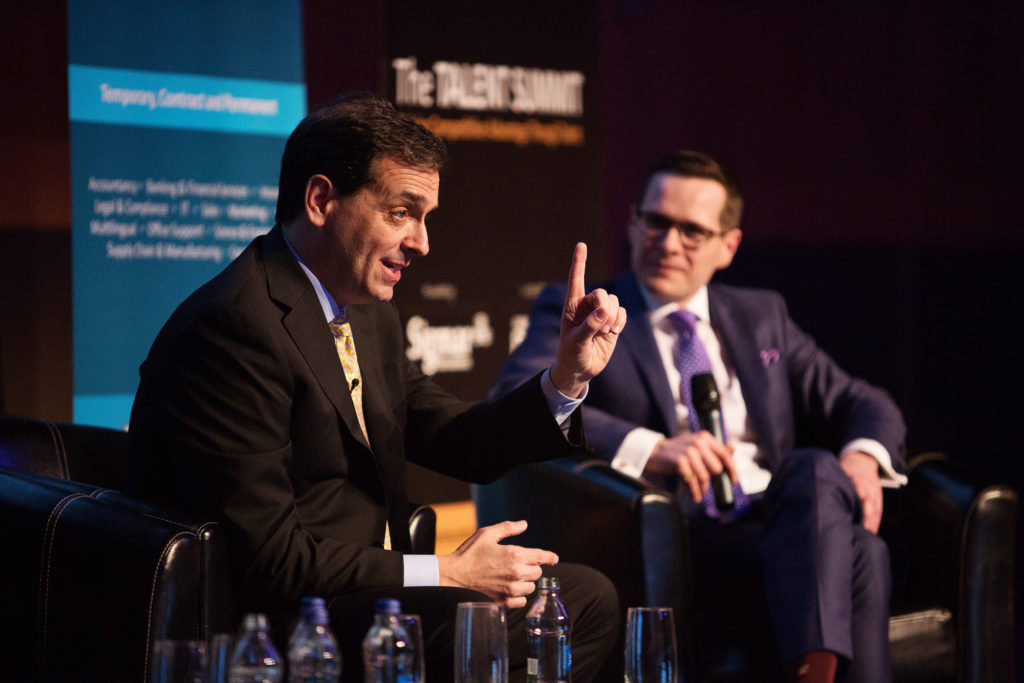Kate Feeney is a Learning and Development Consultant at Insights who was amongst 600 guests who attended The Talent Summit on March 1st 2017 at the Convention Centre Dublin. See her original post on LinkedIn
Here are her 5 takeaways from the event:
1. Sinead Kane is a Visionary
”I could choose to be blind, or I could choose to be a visionary. I chose to be a visionary.”
You might know Sinead as the Cork woman, with 5% vision, who ran 7 marathons on 7 continents, in 7 days. What you might not know about Sinead, is that she studied for her law degree 3 words at a time –painstakingly– using a magnifying glass. What you may also not know is that Sinead couldn’t secure a job as a solicitor after graduation because – employers were blinded to her potential, by her white cane.

Sinead took a voluntary position, and commuted from Cork to Dublin – a casual 6-hour daily commute – for 6 months. The takeaway for me here was: we’re kidding ourselves if we think we’ve cracked diversity and inclusion, and the time has come to address it. This message was reinforced by Director of Diversity & Inclusion Advisory Services, EY – Olivia McEvoy who eloquently noted:
“millennials are intolerant of intolerance, and they ought to be”.
2. Allow for Leaders in the Pack
Rather than being leaders of the pack, managers who facilitate a team’s development of leadership capability – win out. Bernard Brogan, Dublin superstar and Commercial Director of Pep Talk, put the success of the Dublin team, in part, down to the fact that management have encouraged the team to lead from within. In reviewing their success, or failure on the pitch – Brogan noted that the Dublin team are encouraged to come up with their own solutions and recommendations. New squad members are encouraged to lead training exercises, whilst more established players are asked to follow the lead of the newbies. Perhaps it’s this player empowerment that has nudged the Dubs to repeated All-Ireland success (perhaps it’s also influenced in part by our disproportionately large talent pool/population – before someone trolls me!).
Pep-Talk founder Michelle Fogarty and former HR Leader at Twitter EMEA, also emphasized the need for leaders to be honest about the challenges they’re facing in the recruitment process – and to invite candidates to come and help solve them. Later in the day, author, Dan Pink, sang from the same hymn sheet – reminding us that no one has ever sung the praises of a manager who: “watched my every move”.

3. Be a Culture Crafter (and Keeper)
Clodagh Logue shared her experience of crafting the culture at Fitbit, EMEA. It was very compelling to hear how the mission of Fitbit, to empower and inspire you to live a healthier, more active life, has been translated into an organisational culture by Clodagh and her colleagues. The mission, for example, is reflected in the goals of employees (everyone’s working towards a wellness goal of some description); the flexibility of working hours, and in the office fit out here in Dublin (yep, there is a meeting room with treadmills lined up opposite each other).
A particularly timely takeaway from Clodagh was in the importance of not just signalling the culture you want through signs, policies and symbols, but also protecting that culture by addressing behaviour that runs counter to the promise of that culture.
(I say timely because: Uber).
The type of culture that gets crafted of course is influenced in large part by who’s at the helm. We heard from Darrell Hughes, Deputy HR Director at Ryanair, that they don’t do slogans on the wall. It’s easy to conjure an image of Michael O’Leary rolling his eyes at such a thing.
Finally, culture is heavily influenced by the long-term strategy those in leadership employ. Jonathan Campbell of Social Talent shared compelling research on the model of organisational design / strategy that yields the best results. Exec summary: the commitment model, which employees are invested in and partnered with over as long a period as possible, is by far the most successful.
4. Know Thy Organisation
Shane McCauley, Director of People Systems and Analytics at Twitter, shared the outcome of organisational research that they’ve conducted into what their people want from their employee experience. By Shane’s own admission – there was nothing ground breaking in the research output. People want: to learn and grow, a great manager, challenging work, team work, great co-workers, and total reward.
What is potentially ground breaking is that Shane and his team at Twitter are endeavoring to put their research into action to fight attrition. Therein lies the art and science of organisational development.
Alison Hodgson, Country HR Director for McDonald’s, also called out how studying their own workforce has shaped their strategy regarding recruitment. Research revealed that working-mothers, for example, really like working at McDonald’s because of the flexibility it affords. Knowing this means McDonald’s know who to target, with their recruitment ads – to find people who will thrive in their organisation.
5. Do – Learn – Re-Do
In 2016, Lieutenant Commander Darragh Kirwan, and his crew, rescued 14,000 people whilst deployed on a humanitarian mission to the Mediterranean. In explaining the preparation involved for such a mission, the Commander referenced the defence forces learning philosophy which is: train for the known and educate for the unknown.
My takeaway regarding the approach the Defence Forces takes to education is: the recognition of the importance of reflection – in tackling the unknown. After every element of the operation, the crew conducted a wash-up session to codify what worked, what didn’t, and what to do next time. How often do we do this with precision in corporate learning?



